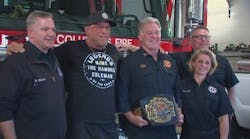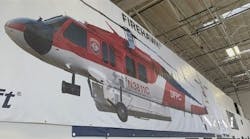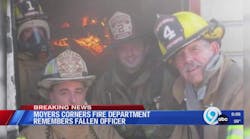Fleet management consultant Paul Lauria told attendees at the FDSOA Apparatus Symposium in Orlando, Fla., today that his profession often gets a bad rap, and he wants to set the record straight.
The author of the Boston apparatus maintenance report said that consultants are sometimes confused with auditors, which makes some people uneasy.
"Auditors are not management consultants, they are not problem solvers," he said. "Our job as consultants is to convince the decision makers that the juice is worth the squeeze."
Despite the current need to reduce costs in a down economy, Lauria said, "I'm not in this business to save departments money. I'm in it to give departments the tools to have an effective program."
He said that in the short-term, for example, a good life cycle schedule will increase costs, but can help reduce costs over time.
"If you have a very robust replacement program, you can get away with a less robust maintenance program."
He said that if fleet managers fear their jobs are in jeopardy because a consultant has been hired, they shouldn't be.
"In the public sector, the use of consultants is a time honored practice. As a fleet manager, if there are things that could be done better, it's not a threat, it's an opportunity. Will some look at it as a threat? Sure.
"For fleet managers, a study is a once in a lifetime thing. I say: Take advantage of the exposure."
Another challenge, he said, is that some people have the "Everyone Thinks They are a Fleet Manager Syndrome." He said that since most people maintain their personal vehicles, they believe they can manage a fleet.
"On one hand, we can relate best practices to those that we make with our own vehicles, but it also simplifies it too much."
While studying the Boston Fire Department's maintenance practices following the fatal Jan. 9, 2009 apparatus crash that killed Lt. Kevin M. Kelley, he said he found that there was a segment of the department that believed fleet management was not important.
"A lot of the decisions made that don't necessarily relate to fleet management have a profound affect on the fleet," he said, noting that issues such as human resources management and tension between the union and fire officials factored into Boston's problems.
He also said the relationship between the fleet management crew and the firefighters is an important one.
"You might not think of firefighters as customer, but to a fleet manager, they are," he said. "It's a collaborative process. You can't have a good program without having the firefighters involved. This was the case in Boston."
He said that while consultants should try to push best practices, they also have to keep reality in mind.
"Doing the right thing for elected officials is fixing the budget for FY 2010, that's what they are getting paid for. As a consultant, you have to balance that out."
"Having better educated clients, over the long haul, they are going to be able to make an impact on the performance of their fleet."





